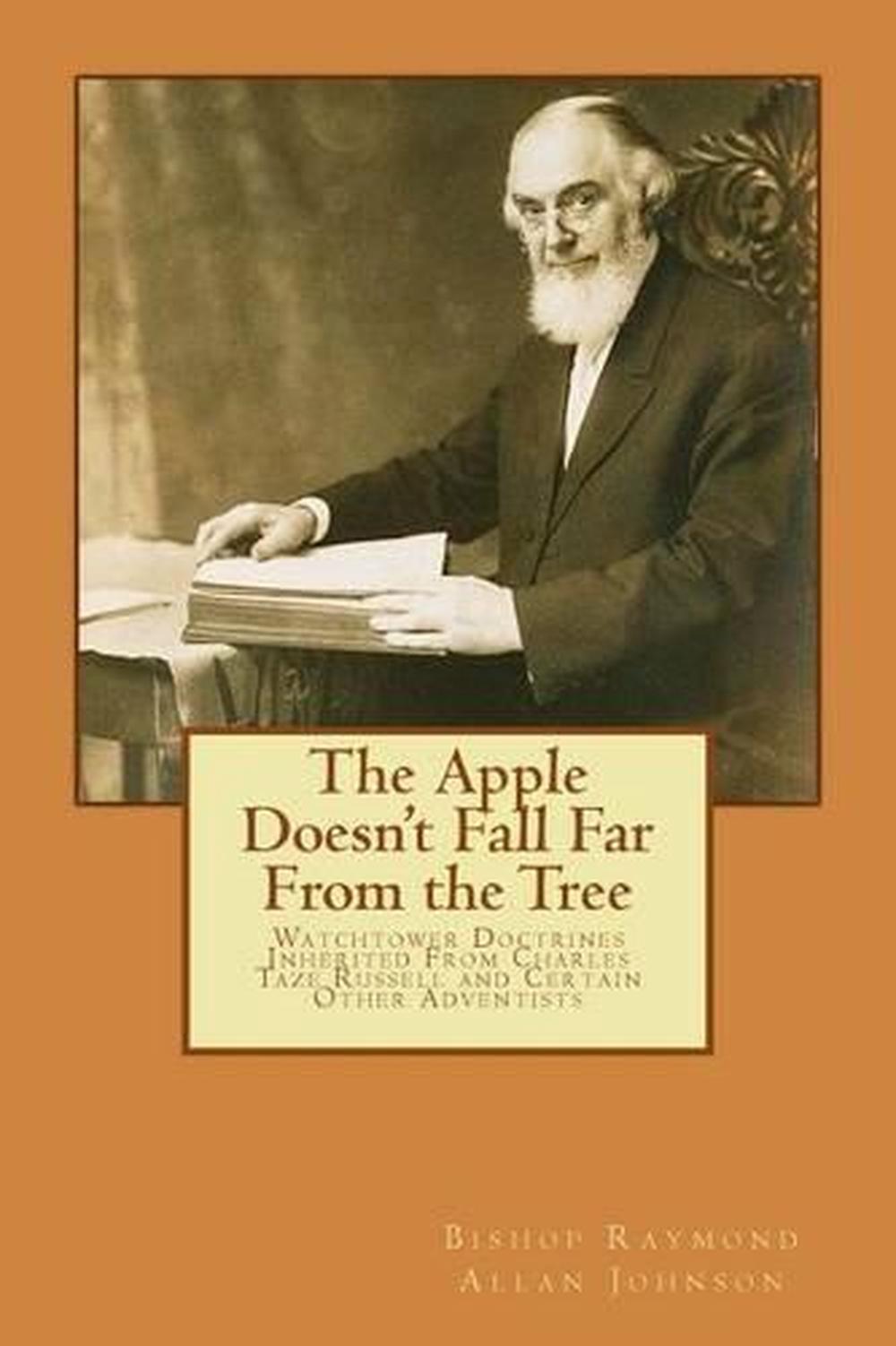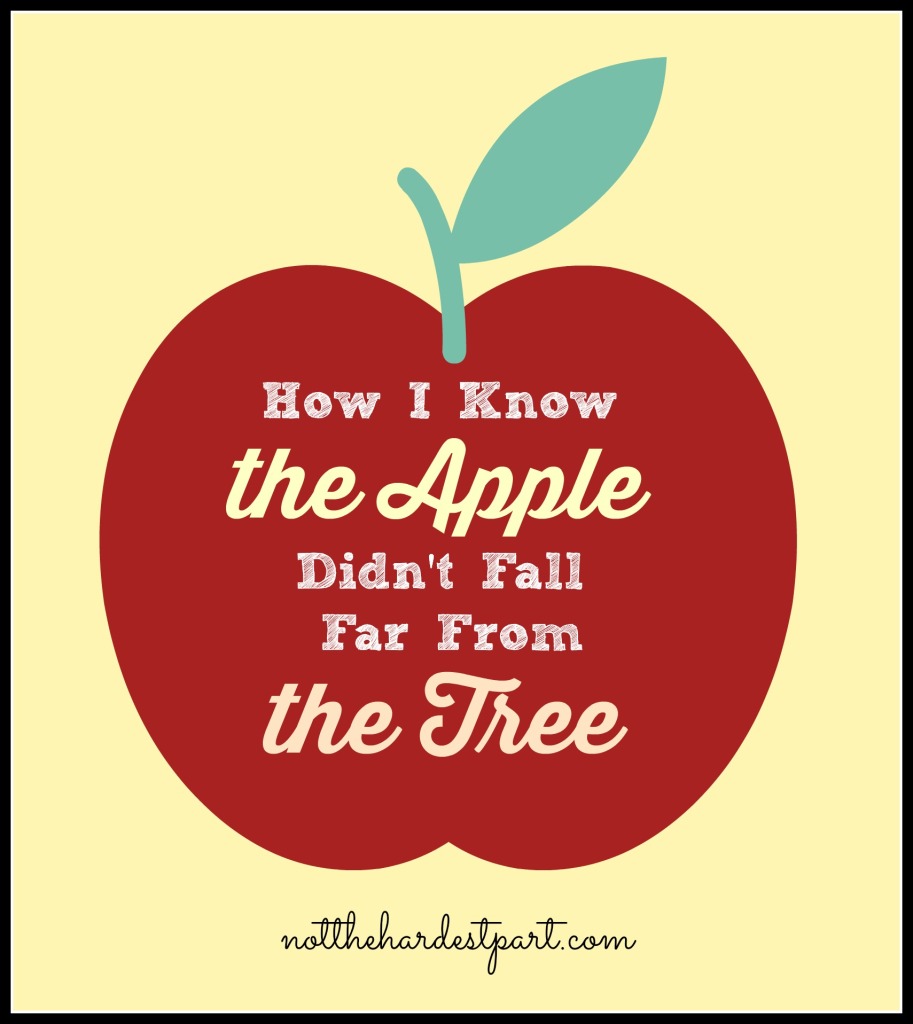
"the apple doesn't fall far from the tree" "but apple trees are often on a hill so the apple
According to the following source the adage The apple doesn't fall far from the tree originated in AmE in the first half of the 19th century: . The first recorded use in the USA was by Ralph Waldo Emerson in 1839, one of America's best known 19th century figures.. But they also add that: Versions of this proverb can also be found earlier in works written in German and Russian; with some.

[Proverb] The apple doesn't fall far from the tree Moms favorite, Tree, Apple
English in a Minute: Like Oil and Water. When an apple drops from an apple tree, it does not fall far from it. But what does it mean when you say this about a person?

Pin by Jenni Patton on Southern belle raised. ️ ️ Southern words, Funny southern sayings
My brother Jake has the same enthusiasm and work ethic as our dad, proving once again that the apple doesn't fall far from the tree. Origin "The apple doesn't fall far from the tree" originates in nature. It refers to the observation that seeds and fruit from a plant or tree tend to develop near the parent plant. In essence, offspring.

The apple doesn't fall far from the tree Idioms Meaning
This expression has tends to have a negative connotation these days. Similar expressions with a more positive bent are a chip off the old block; and like father, like son (like mother, like daughter). The apple doesn't fall far from the tree: The source of this phrase and how to use it.

Evolution Apples Don't Fall far from their Tree Lab activities, Special education
The apple never falls far from the tree. Posted by ESC on October 24, 2000. In Reply to: Origin and meanifng of below listed saying posted by anne on October 23, 2000: the apple never falls far from the tree. THE APPLE DOESN'T FALL FAR FROM THE TREE - "Apparently of Eastern origin, it is frequently used to assert the continuity of family characteristics.

the apple doesn't fall far from the tree On The Fritts Designs
Origins of the idiom "the apple doesn't fall far from the tree" Some references point towards this phrase originating in Asia and being used in Germany. Richard Jenie, who wrote German Proverbs from the Orient (), mentions that this proverb appeared in the year 1585.. It can be found in print in the German book Aroemiologia Polyglottos dated 1605 by Hieronymus Megiser.

The Apple Doesn't Fall Far from the Tree Watchtower Doctrines Inherited from Ch 9781514155813
Very soon after that, in 1843, George Henry Borrow's The Bible in Spain included this: 'The apple', as the Danes say, 'had not fallen far from the tree'; the imp was in every respect the counterpart of the father. So, we have a proverb variously ascribed to the Icelanders, the Germans and the Danes. Who originated it and where is an.

An apple never falls far from the tree thrown of Proverbs VICOBY
Final Words. The expression "the apple doesn't fall far from the tree" is often used to describe how children tend to inherit the characteristics of their parents. It originated in 1839 with Ralph Waldo Emerson in the United States, but it seems to have been inspired by an old German proverb. I hope this quick guide helped explain that!

The apple does not fall far from the tree. Picture Quotes. Tree quotes, Autumn trees, Apple quotes
Origin. The origin of the expression "the apple doesn't fall far from the tree" often features as a synonym describing the experience of Adam and Eve in the Garden of Eden. However, no written evidence shows a connection between the saying and this biblical story. The earliest recorded use of the proverb comes from a translation of.

The apple doesn't fall far from the tree
The idiom 'the apple doesn't fall far from the tree' is often used to convey the idea that children often resemble or inherit characteristics from their parents, either in terms of physical traits or, more commonly, in behavior and personality. It suggests that family traits or tendencies are passed down from one generation to the next.

The Apple Doesn't Fall Far From The Tree by Grace M
Her artistic talent comes from her parents - the apple doesn't fall far from the tree. Origin. The origin of this phrase dates back to the 16th century where it was first used in a proverb by John Heywood. FAQs Question. What does the idiom "The apple doesn't fall far from the tree" mean? Answer

The Apple Doesn't Fall Far From the Tree...Or Does It? Apple, Tree quotes, Tree
Meaning: The apple doesn't fall far from the tree is a phrase that is typically said in connection with children who show qualities or talents that are similar to those of their parents.. Example: Dan was an older man with back problems, so he disliked having to carry in a car full of groceries. Lifting everything inside was such a pain! But one day when Dan returned from shopping, his.

The Apple Doesn't Fall Far From The Tree by Maeve M
THE APPLE DOESN'T FALL FAR FROM THE TREE definition: 1. a child usually has a similar character or similar qualities to his or her parents: 2. a child…. Learn more.

CACKLE'N COMICS
Quotes. > Quotable Quote. (?) "It reminds me of that saying: "The apple doesn't fall far from the tree.". I guess that means we're just products of whoever made us and we don't have much control. The thing is, when people use that phrase, they ignore the most critical part: the falling. Within the logic of that saying, the apple.

The Apple Doesn't Fall Far From The Tree by Maeve M
A dialogue with Susan from last August: Susan:.. the apples do not fall too far from the tree indeed. Mo: well, it does if something affects its trajectory or if it's a tilting apple tree on.

How I Know the Apple Didn’t Fall Too Far From the Tree The Waiting
The meaning of the idiom apple doesn't fall far from the tree is that children inherit the same traits and characteristics as their parents. The phrase usually refers to physical or personality similarities between a parent and child. Ralph Waldo Emerson is credited with using the phrase for the first time in the United States in 1839.